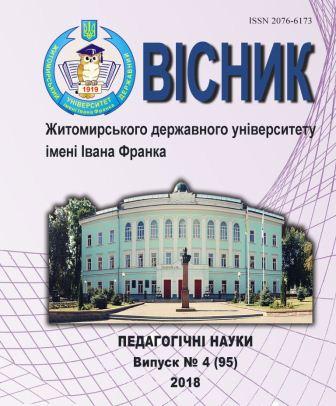Communicative Approach in Teaching Italian as a Second Foreign Language
DOI:
https://doi.org/10.35433/pedagogy.4(95).2018.12-16Keywords:
communicative approach, teaching Italian, second foreign language, professional communicative preparation, future philologists, creative writing, communicative competence, communicative preparationAbstract
The article is dedicated to the theoretical and methodical investigation of the specific of teaching Italian as a second foreign language and improving their level of the professional communicative competence in class. The perspective of using communicative approach is released as well as the requirements for their choice. It is mentioned that small talks are essential resource in time of new terms learning and that in general they improve the level of the translators' professional communicative preparation. The specific of the contemporary communicative preparation in teaching Italian is caused by integrational processes in our society, globalization and access to the information worldwide web, the necessity in highly competent specialists in the translation field, tourism and translation. The requirement of our time is to change the approach of our educational paradigm giving priority to the communicative preparation, which points out the main aim of the teaching process at the university level. The experimentally proved system of the communicative approach in teaching Italian as a second foreign language consists of three main stages: preparation, main body and analyses. The quintessential part of the technology is the formation of imprinting in time of learning new words and being ready to write the individual creative essays. Communicative approach is directed on the foreign communicative competence formation of the future philologists.References
Barnstone Willis The Poetics of Translation : History. Theory. Practice / Barnstone Willis. – London : Yale University Press, 1993. – 302 p.
Berube Michael The Employment of English : Theory, Jobs, and the Future of Literary Studies / Michael Berube. – New York : NYUP, 1998.
Bialystok E. Communication Strategies : A Psychological Analysis of Second Language Use / E. Bialystok. – Oxford : Blackwell, 1990.
Carolyn P. Sobel The Cognitive Sciences : An Interdisciplinary Approach Mayfield Publishing Company Mauntain View. – California, 2001. – 325 p.
Ciabattari Jane Workshop : A Revolution of Sensibility / Jane Ciabattari // Poets & Writers Magazine. – Jan. / Feb, 2005. – Pp. 69–72.
Common European Framework of Reference for Languages : Learning, Teaching and Assessment. – Trim J. L. M. (Ed.). – Cambridge University Press, 2001. – 276 p.
Mayers Tim Writing Craft : Composition, Creative Writing, and the Future of English Studies / Tim Mayers. – Pittsburgh : U of Pittsburgh Press, 2005.
Peter D. McClelland Readings in Introductory Macroeconomics [Text] : 1990–1991 Annual Edition / McClelland D. Peter. – New York ; St. Louis : McGraw-Hill, Inc., 1991. – 256 p.
Russell R. G. The Need to Teach Communication Strategies in the Foreign Language Classroom / R. G. Russell, L. Loschky // JALT Journal. – Volume 20, No. 1, 1998. – Pp. 34–45.
Downloads
Issue
Section
License
Copyright (c) 2019 O. V. Stebaieva Stebaieva

This work is licensed under a Creative Commons Attribution-NonCommercial-NoDerivatives 4.0 International License.
Authors published in this journal agree to the following terms:
a) The authors reserve the right to author their work and grant the journal the right to first publish this work under the Creative Commons Attribution License, which allows others to freely distribute the published work with a mandatory link to the authors of the original work and the first publication of the work therein magazine.
b) Authors have the right to enter into separate additional agreements regarding the non-exclusive distribution of the work in the form in which it was published by this journal (for example, posting work in an electronic repository of the institution or publishing as part of a monograph), provided that the reference to the first publication of the work is maintained therein. magazine.
c) Journal policy permits and encourages the submission of manuscripts by the authors on the Internet (for example, in repositories of institutions or on personal websites), both prior to submitting this manuscript to the editorial board and as it contributes to the emergence of productive scientific discussion, and has a positive impact on the promptness and dynamics of citing a published work (see The Effect of Open Access).


 ISSN
ISSN 





